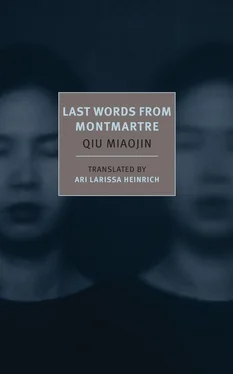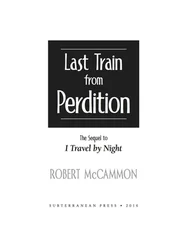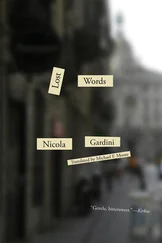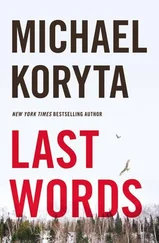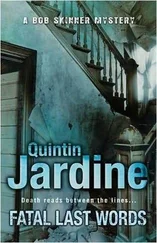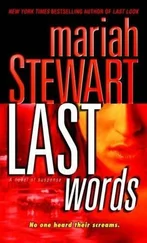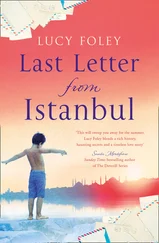Xu, you don’t know how I love you. I’ll be here till the end loving you this way. You don’t know how I love you, or maybe you just don’t want to know…. You dismiss the value of my love, plaguing me with ulcers. But I’ll use my life to prove my beauty and my love; I’ll use an “immortal” self to make my love shine forth with its lustrous glow, and I’ll persuade you that all of this is the ultimate meaning of life. But I’ll stop talking about it now, and keep my silence. Heaven will make people understand, as you will too….
Lost, lost! Besides completely losing you, I will never fully love as I had dreamed, nor will I ever let you love me again. My God, could you be more any more thorough and move one step farther, two steps, three steps until you’re gone, stripped from my life…. I know now no enormous suffering of losing you, I will keep loving you.
Xu, love is not only emotions, moods, passions. Love is a kind of “will.”
I must learn how to be quiet with you, learn how to not harm you and then love will be revealed, like a boulder beneath a receding wave….
Tranquil love is not love. The tranquillity of a bear at rest is not true tranquillity. Everything is the bear in motion, dialectical, and everything has consequences. Indeed.
MAY 29
Today is my birthday. Ah-Ying put a cute coffee-colored bear on my bed. On the bear’s belly is a sign that says “Happy Birthday.” I’m touched. Touched that someone like Ah-Ying risks the consequences of this world. Most I’ve encountered are too selfish and miserly to love, either people or the world. Living here with Ah-Ying, I often admire her. She’s an independent, mature, courageous, pure, deeply feeling person who knows what it means to give freely. I need such a person with me.
Gaiety is better than amusement, and joy is better than gaiety . (Scott)
If I have not killed myself, it’s because art and virtue have stopped me. (Beethoven)
Angelopoulos didn’t win the Palme d’Or at Cannes, and I wept for him. But fame and glory are not an artist’s nectar; they are a poison-tipped sword! Cast off the world of dust and keep working, Angelopoulos.
On Saturday the twenty-seventh I attended a lecture on the sculpture of Paul Landowski. I admire the vitality of his work, and though he is one of the most revered sculptors since Rodin, I wouldn’t agree exactly. The only pieces that moved me were Les Fantômes, La France, Le Retour Éternal, Les sources de la Seine, Le Monument de Narvir , and a rose-colored sculpture of a woman looking upward in prayer that was part of Le Temple de l’Homme. I find that an artist’s work only really moves me if the artist has suffered through profound tragedy and death — only then can greatness be achieved. Landowski’s sculpture La porte de l’école is layered with meaning. Better still are Les Fantômes and La France , both of which he carved in fulfillment of a promise to make fallen soldiers “rise again” after the Second World War. In the wilderness of an old battlefield, the figures of eight soldiers stand tall with their heads held high, looking at the sky, and low on the slope of a distant mountain is a woman holding a shield representing the spirit of France, her skirt rippling in the wind…. These could be the most heroic works of Landowski’s career.
Last night the film Underground by Emir Kusturica, who also made Time of the Gypsies , won the Palme d’Or, beating Angelopoulos’s Ulysses’ Gaze . I think the reason was political. The ongoing Bosnian war and the siege of Sarajevo are surely the legacy of long-lasting European conflicts, and the jury must have been thinking about Yugoslavia in awarding Kusturica the prize. If Underground is as realized as Time of the Gypsies , then I have no issue with this. I see more of his films — already he’s on his eighth and so young. If there are four among them that are as good as Time of the Gypsies then he will be the next director I hold dear in my heart, third after Tarkovsky and Angelopoulos. In my third year in France, I’ve realized that in the cinematic arts there are only a few directors who thrill me. Their spirit doesn’t lie in France but rather in the northernmost and southernmost parts of Europe. To the north are the Russians Andrei Tarkovsky and Nikita Mikhalkov, and to the south is the Greek Theo Angelopoulos and the Serbian Emir Kusturica. The living French directors Godard, Robiner, Louis Malle, Rivette, and Chabrol are middling spirits, and the next generation of post-baroque directors like Beineix, Besson, and Carax are all still so young in their art that you can see their stylistic limitations; who knows if they’ll improve with age.
In every young artist you can perceive a spiritual disposition of how they will develop. For me, the distinguishing features of this spiritual topographic map of European cinema have been formed by my experiences of the past three years. Oh Xu, I beg you not to cast me aside because I’m far away, oh don’t casually cast me aside here in Paris. I’m in Paris so that I can mature into a working artist, so that I can mature into a beautiful spirit worthy of your lifelong love, so please don’t cast me aside for my choice! It’s not that I’ve left you behind. I can pack my luggage and return to you in an instant. Whatever can be achieved in this world through art means nothing to me. Loving you is more important than my artistic destiny. But you’ve exiled me from our country and refuse me and never call me home, saying you’ve never felt that you needed me…. Without your summoning, I have no choice but to heed the call of my artistic destiny and move on in exile. Your casting me away is purely a casting me away and nothing less, and if there’s only one little thread holding me to this distance, then you’ve misunderstood me and have made a great mistake, a very concrete mistake.
Work, for only in working can everything be forgotten! my teacher once said. Beethoven, Landowski, Angelopoulos, and other artists are teaching me this, and in this life what I really want to become is an artist like Angelopoulos — to become a “shaman.”
MAY 31
(We have nothing to fear but insincerity.)
The mouth stands for sincerity. The nose stands for generosity. The eyebrows stand for integrity. The eyes stand for sexual prowess….
I stroke her face lightly, every feature, murmuring to her how beautiful she is to me. Yes, it’s her. The image that flashes through my mind is of a bird flying past drifting clouds; the illusion is what floats to the surface of the water when you stare into it. Is that what I saw among the hovering clouds? Or is it what I’ve seen in my heart? An image I dreamed of her? Or is the flowing water itself an illusion?
Yes, she is a simple woman. I can’t describe Xu’s physical appearance, how her beauty is engraved in my heart…. I think a sculptor must carve the way his lover looks in his mind by imagining, that he must find a temporal focus as solid as marble in order to chisel out a permanent image in the shifting sands. This is how it is, right?
I met Xu in September 1992 and in December I boarded a plane to Paris; our chance meeting became a honeymoon. I first lived in a small village, and the following September I moved to Paris for graduate school. That June we took an oath and maintained a perfect relationship and Xu resolved to be the rock supporting my vague ideas about studying abroad, illuminating the path of my lonely self-pursuit with her radiance. More than three hundred letters kindled my love’s glowing resplendence. This love, this grace, how can I deceive myself that there is someone as beautiful waiting for me; how can I ignore my heart and tell myself that I could love someone else; how could I pretend not to have seen the outline of my life as she tailored it and say that I could belong to someone else and say that this isn’t how “love” is, it’s something other, it’s somewhere else….
Читать дальше
